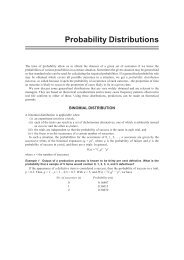International-Business-Dr-R-Chandran-E-book
International-Business-Dr-R-Chandran-E-book
International-Business-Dr-R-Chandran-E-book
Create successful ePaper yourself
Turn your PDF publications into a flip-book with our unique Google optimized e-Paper software.
131<br />
<strong>International</strong> <strong>Business</strong>- <strong>Dr</strong>. R. <strong>Chandran</strong><br />
condition. Chrysler workers in Canada did not appreciate the instructions<br />
from the US Congress to accept a reduced wage.<br />
The examples below illustrate some of the controversies faced by<br />
MNCs.<br />
Parke-Davis<br />
Parke-Davis India is a 40% subsidiary of Parke-Davis Inc, USA which in<br />
turn is a division of the US-based company, Warner-Lambert. In 1995 the<br />
latter set up a 100% subsidiary. Among other products, it planned to<br />
manufacture and market confectionary products, although Parke-Davis India<br />
was already operating in this field. Later the parent company bought the<br />
brands of ‘Halls’ and ‘Chiclets’ from Parke-Davis India for about Rs.10<br />
crores, which according to analysts was low price in relation to growth<br />
prospects and sales. Post-transfer, the sales of Parke-Davis grew just 3% in<br />
1995-96 and then fell 1.5% the following year. And revealingly while the<br />
Sensex dropped 39% in 17 months from September 1994, Parke-Davis<br />
shares plunged almost 70% in the same period. Practically, a loss of about<br />
Rs.285 crores in market capitalization was witnessed during the same<br />
period.<br />
Pfizer<br />
There is undeniable attraction for an MNC to retain all the profits of a<br />
venture, rather than sharing them with minority shareholders. Obviously<br />
such a prospect is attractive to the MNC and alarming to the retail investor,<br />
especially since the regulatory framework cannot control corporate action in<br />
this matter. Although not having to share the profits may be the real reason.<br />
MNCs cite other factors, including lack of stringent patent and copyright<br />
laws in India for their actions. Often it is also the high cost of acquiring the<br />
additional shares to take the parent company’s holding above 51%. For<br />
example the additional 11% equity stake required for Pfizer would set the<br />
parent company back some Rs. 290 crore at the current valuation, and to buy<br />
out the remaining 60% from the other shareholders, would cost it Rs.775<br />
crore. Setting up a 100% subsidiary is possible.<br />
SmithKline Beecham<br />
This case gives us an insight into the royalty issues. In 1997, SmithKline<br />
Beecham India announced its plan to pay 5% of net revenues earned from<br />
the sale of Horlicks to its parent company for using the brand name. At that<br />
Only for Private Circulation





